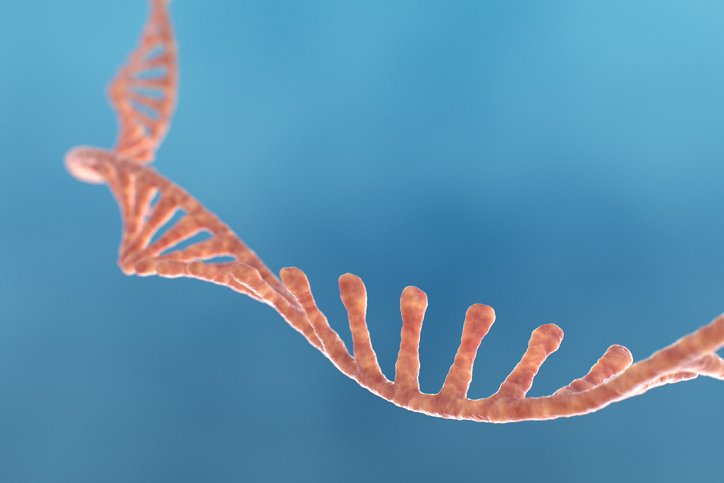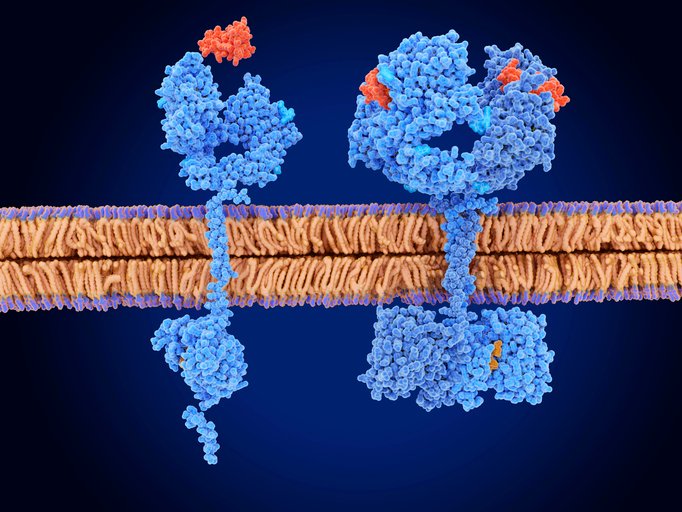Bayer will partner with Kumquat Biosciences to develop Kumquat’s KRAS G12D inhibitor through a collaboration that could generate up to $1.3 billion-plus for the San Diego biotech, while bolstering Bayer’s early precision oncology portfolio with a potential treatment for pancreatic, colorectal, and lung cancer, the companies said Tuesday.
The collaboration comes after the FDA last month cleared Kumquat’s investigational new drug (IND) application to begin clinical trials of the KRAS G12D inhibitor. Bayer and Kumquat reason that while KRAS mutations occur in nearly 25% of human cancers, G12D is the most prevalent oncogenic KRAS variant that still lacks effective treatment options, citing a 2014 review article published in Nature Reviews Drug Discovery.
Bayer and Kumquat also cited findings from one 2021 study showing that KRAS G12D mutations were found most frequently in 37% of pancreatic ductal adenocarcinoma (PDAC), 13% of colorectal cancer, and four percent of non-small cell lung cancers (NSCLCs). Another 2021 study cited by the companies showed PDAC is the most common type of pancreatic cancer, accounting for 85% of cases, and remains one of the most difficult tumors to treat, with patients having few treatment options beyond chemotherapy and the five-year survival rate being less than 10%.
“We look forward to exploring the investigational KRAS G12D inhibitor, which targets a highly relevant signaling pathway that promotes tumor growth and survival,” Dominik Ruettinger, MD, PhD, global head of research and early development for oncology at Bayer’s Pharmaceuticals Division, said in a statement. “KRAS mutations are crucial for cancer development and can be targeted with specific therapies in a more selective manner.”
Bayer shares inched up nearly one percent, from $25.71 to $25.96, in trading on the Frankfurt Stock Exchange’s Xetra market. Kumquat is privately held.
Targeting KRAS variants
Through the collaboration, Bayer joins a growing number of drug developers that are seeking to treat forms of cancer by inhibiting variants of KRAS.
Amgen brought the first KRAS-targeting drug to market after winning FDA approval in 2021 for Lumakras® (sotorasib), a treatment for KRAS G12C-mutated NSCLC—followed a year later by agency approval for Krazati® (adagrasib), whose developer Mirati Therapeutics was acquired by Bristol Myers Squibb (BMS) for up to $5.8 billion in a deal completed in January 2024.
BMS had pursued development of a KRAS G12D inhibitor until March, when it ended development of another Mirati-inherited candidate MRTX1133, two months after ending the Phase I portion of a Phase I/II trial (NCT05737706) due to formulation challenges that according to a published report related to pharmacokinetics.
“While there are many other clinical/preclinical-stage G12D assets, we think the lack of clinical data overall provides scarcity value for G12D,” Kelly Shi, PhD, an equity analyst with Jefferies, wrote Tuesday in a research note.
That scarcity value, Shi added, is potentially good news for three KRAS G12D inhibitors in development. One is zoldonrasib, whose developer Revolution Medicines according to Shi showed initial validation in PDAC and NSCLC due to the drug’s tri-complex inhibitor platform, designed to target the active, RAS(ON) state of the oncogenic RAS protein. Revolution has been discussed as advancing zoldonrasib into pivotal studies next year.
The other KRAS G12D inhibitors cited by Shi are VS-7375 (Verastem and GenFleet), designed to inhibit both ON and OFF states of KRAS G12D, and which has also shown early efficacy in PDAC and NSCLC; and INCB161734 (Incyte), for which initial data is expected to be reported later this year at the European Society for Medical Oncology conference (ESMO; Oral Presentation #916O).
Attractive target
Several pharma giants are also attracted enough to the potential of KRAS G12D as a target to develop their own inhibitors, including:
- Astellas Pharma—Two Phase I protein degraders targeting solid tumors: the company’s lead protein degrader ASP3082, a proteolysis-targeting chimera (PROTAC) molecule under study in a Phase I trial (NCT05382559); and ASP4396, a selective protein degrader also in a Phase I study (NCT06364696).
- AstraZeneca—AZD0022, an oral small molecule selective inhibitor licensed from Usynova for $24 million upfront plus potential milestone payments, now under study alone and in combination with Eli Lilly’s Erbitux® (cetuximab) in a Phase I/II trial (NCT06599502); and NT-112, a TGFBR2 (Transforming Growth Factor Beta Receptor 2) KO (knockout) armored T cell receptor T cell therapy (TCRT) being developed by AZ subsidiary Neogene Therapeutics. NT-112 is in a Phase I trial (NCT06218914) being studied alone and in combination with AZD0240, a KRAS G12D armored TCRT.
- Eli Lilly—LY3962673, which the company says is highly selective against HRAS, NRAS, KRAS-wildtype, and other non-G12D KRAS mutations, under study in the Phase I MOONRAY-01 trial (NCT06586515).
- Roche—GDC-7035, also called RG6620, a KRAS G12D inhibitor under study in a Phase I trial (NCT06619587).
Trial to be launched
Kumquat has agreed to launch and complete a Phase Ia study of the KRAS G12D inhibitor, with Bayer having agreed to complete development and commercial activities related to the candidate.
Under their global exclusive license agreement, Bayer has agreed to pay Kumquat up to $1.3 billion, consisting of an upfront payment of undisclosed amount, payments tied to achieving clinical and commercial milestones, plus additional tiered royalties on net sales.
Kumquat retains an exclusive option to negotiate with Bayer to share profits and losses in the U.S.
“This collaboration with Bayer validates the strength of our platform and the potential of our KRAS G12D candidate to address long-standing unmet needs in oncology,” Kumquat CEO Yi Liu stated.
“While advancing optimally our KRAS G12D program through the clinic, this collaboration provides Kumquat the financial resources to accelerate its broader clinical pipeline for long-term value, and position Kumquat to deliver life-changing medicines and achieve sustained growth in the coming years,” Liu added.
The post Bayer, Kumquat Target KRAS Variant in Up-to-$1.3B+ Cancer Collaboration appeared first on GEN – Genetic Engineering and Biotechnology News.



